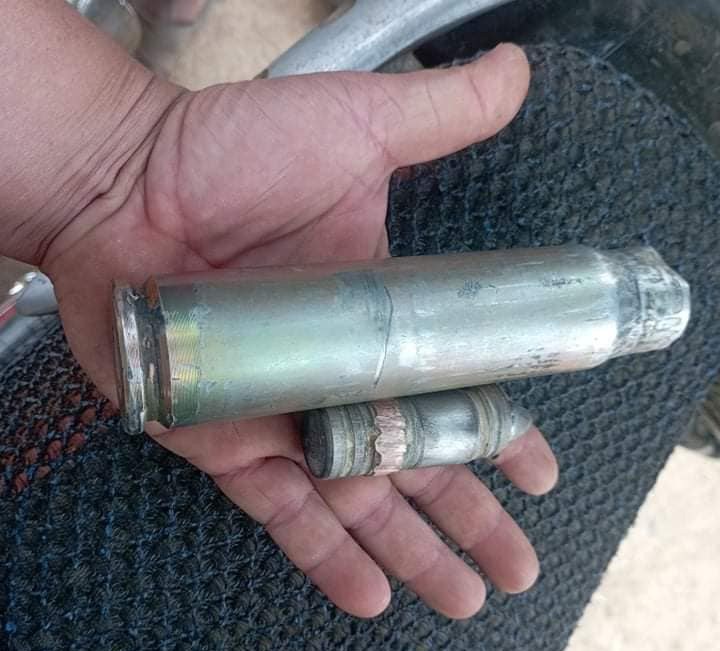A military airstrike last week on a village in Myanmar’s northern Sagaing region where an earlier attack killed nearly 200 people was part of a bid to “destroy evidence,” a member of the armed opposition said Monday, as reports emerged that the latest bombing killed nearly 20 of the junta’s own troops.
The junta’s April 11 air raid on the opening ceremony of a public administration building in Kanbalu township’s Pa Zi Gyi village is believed to be one of the deadliest attacks on civilians in Myanmar since the February 2021 coup. The attack has drawn condemnation from across the globe.
On April 20, the military carried out a second airstrike on Pa Zi Gyi, although no civilian casualties were reported, as residents had fled the village following the earlier attack.
Ba La Gyi, the head of the anti-junta People’s Defense Force paramilitary group in Ma Lal sub-township, told RFA Burmese that he believes the military carried out the second airstrike to cover up the devastation and loss of life caused by the first one.
“I think they aimed to hide or destroy evidence that they killed innocent civilians in their first airstrike,” he said. “Since they haven’t been able to find either the civilian refugees or the PDF fighters, they bombed the village to set it on fire.”
During the April 11 attack, jets bombed and helicopters strafed the opening ceremony for a public administration building in the village. It was the latest example of the junta’s increased use of air power in their conflict with armed resistance groups amid falterning progress on the ground.
Witnesses have said that it was hard to tell how many people had died in the attack because the bodies were so badly mangled by the bombs and machine gun fire.
Ba La Gyi, who was near Pa Zi Gyi at the time of the follow-up attack on the morning of April 20, said two separate junta columns of around 100 troops each raided the village and “went through everything.”
“I believe they were looking for refugees [who might have returned to the village],” he said. “At about 2 p.m., they fired heavy artillery into the village from the southwest. They fired exactly 10 times … At 2:26 p.m, a jet fighter flew over and fired at the village after dropping a bomb.”
Military account disputed
Myanmar’s military confirmed in a statement that it had carried out a “precision” attack on Pa Zi Gyi on April 11 because members of the armed resistance had gathered there and “committed terrorist acts.” Junta Deputy Information Minister Major Gen. Zaw Min Tun also claimed that the large number of casualties was the result of a rebel weapons cache exploding during the operation.
But rescue workers have disputed that account. They say the attack on the site was deliberate and thorough, beginning with a jet fighter bombing run and followed by an Mi-35 helicopter strafing the area.

On Monday, Pa Zi Gyi resident Kyaw Tint accused the junta of making false reports about the airstrike.
“Since their attack drew major attention from the international community, the junta tried to cover up its brutality with false accusations that some weapons and ammunition depots exploded during the bombing,” he said. “That’s why they entered the village [on April 20] and I think they are going to fabricate evidence, saying they obtained proof of their accusations.”
Attempts to reach Zaw Min Tun for comment on claims that the second attack was part of a junta cover up went unanswered Monday.
But Thein Tun Oo, the executive director of the Thayninga Institute for Strategic Studies group, which is made up of former military officers, called the operations in Pa Zi Gyi “ordinary … from an anti-terrorism standpoint” and said they were ordered because the opening of a public administration building in the area was tantamount to a “declaration of autonomy.”
“No government of a country can accept a declaration of autonomy within its sovereign territory,” he said. “When you consider the matter of national law and security seriously, human rights and other issues are less important.”
Pyae Sone, a member of the Kanbalu PDF, said that the attacks are proof that the junta will not be moved by international pressure.
“It also shows that the junta is determined to oppress the people even more severely and brutally,” he said. “I also think the attacks aimed to destroy the evidence left from the first airstrike.”
Friendly fire incident
Meanwhile, reports emerged Monday that nearly 20 military troops were killed and more than 10 injured in last week’s follow-up airstrike on Pa Zi Gyi when a junta aircraft mistakenly bombed its own soldiers.
A resident of the village told RFA that a jet fighter dropped six bombs in the April 20 airstrike, hitting junta troops stationed nearby.
“This morning, at about 9:00 a.m., they were picked up by three civilian vehicles,” said the resident. “Seven injured junta soldiers were taken away. We got reports that they are being treated at a 100-bed hospital in Thabeikkyin township. I think they have buried the bodies of the dead junta soldiers near the village.”
The resident said that the junta’s 13th Shwebo Training Platoon, which is composed of nearly 200 soldiers, had been stationed near Pa Zi Gyi since April 19.
Other residents also reported military casualties in the latest airstrike and confirmed earlier reports that none of the village’s inhabitants were victims of the attack.
RFA has been unable to independently verify the claims.
Attempts by RFA to contact Aye Hlaing, the junta’s spokesman and Sagaing region social affairs minister, for comment on the incident went unanswered Monday.
Residents of Pa Zi Gyi said Monday that they have been unable to investigate the condition of the village amid the continued presence of junta troops in the area.
Translated by Myo Min Aung. Edited by Joshua Lipes and Malcolm Foster.



